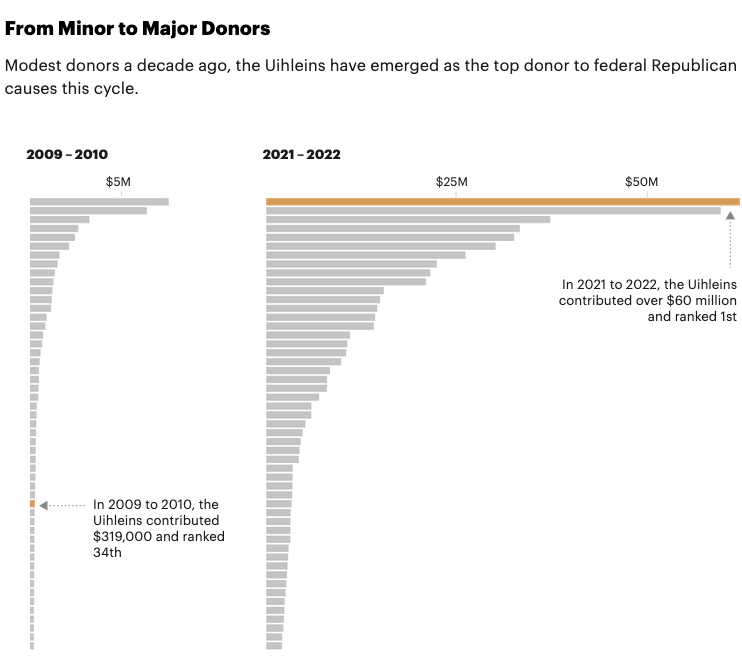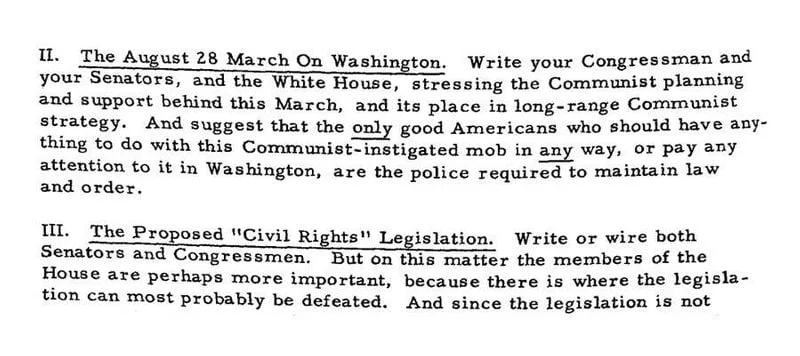Much of the cardboard and paper goods strewn about our homes — the mail-order boxes and grocery store bags — are sold by a single private company, with its name, Uline, stamped on the bottom. Few Americans know that a multibillion-dollar fortune made on those ubiquitous products is now fueling election deniers and other far-right candidates across the country.
Dick and Liz Uihlein of Illinois are the largest contributors to Pennsylvania gubernatorial candidate Doug Mastriano, who attended the Jan. 6 rally and was linked to a prominent antisemite, and have given to Jim Marchant, the Nevada Secretary of State nominee who says he opposed the certification of Joe Biden’s election victory in 2020. They are major funders to groups spreading election falsehoods, including Restoration of America, which, according to an internal document obtained by ProPublica, aims to “get on God’s side of the issues and stay there” and “punish leftists.”
Flush with profits from their shipping supply company, the Uihleins have emerged as the No. 1 federal campaign donors for Republicans ahead of the November elections, and the No. 2 donors overall behind liberal financier George Soros. The couple has spent at least $121 million on state and federal politics in the last two years alone, fighting taxes, unions, abortion rights and marijuana legalization.
Uline’s core business — selling boxes — is so boring there’s an entire Simpsons bit devoted to its dullness. But tax records obtained by ProPublica show the company, which is privately held and does not publicly disclose financial results, has experienced an astonishing boom.
The Uihleins, who make the vast majority of their money from the company, reported around $18 million in income in 2002, according to the records. That rocketed fortyfold, to $712 million, in 2018. Thanks to the pandemic-induced online shopping surge, Uline has grown even more since.
While the Uihleins rarely speak to the press — they didn’t respond to requests for comment for this story — they have become well known in political circles. But the explosion of the Uihleins’ wealth as well as the roots of their politics have not been well understood.
The German-American clan made their original fortune in the 19th century as owners of the Milwaukee brewery Schlitz. Family members were staples of the Chicago Tribune society pages. In 1917, Dick’s grandfather was identified as a millionaire in a Chicago Tribune humor item about how the wealthy man had fired an unqualified chauffeur.
When Dick and Liz Uihlein donated millions in recent years to the pro-Trump super PAC America First Action, they were following in a family tradition. Edgar J. Uihlein of Chicago was among the handful of largest donors to the original America First Committee, the aviator Charles Lindbergh’s group that opposed the United States’ entry into World War II. (It’s unclear whether that was Edgar Sr., Dick’s grandfather, or Edgar Jr., his father, who had just graduated from college.) While America First drew supporters from across the political spectrum, it was most associated with rightists. Uihlein’s donation was disclosed in 1941. Later that year, Lindbergh gave an openly antisemitic speech assailing Jewish influence.
When Edgar Uihlein Sr. died in 1956, his estate was valued at $4.8 million — more than $50 million in today’s dollars — and the money was left in a trust for his heirs, newspapers reported at the time.
Dick’s father, Edgar Uihlein Jr., who had started a plastics company after serving in the Navy during World War II, established himself as an important funder of far-right political groups in the 1960s.
A document from 1963 identifies Edgar Uihlein Jr. as on the National Finance Committee of the John Birch Society. Founded a few years earlier, the group quickly became a significant force to the right of the Republican Party, known for its obsessively anti-communist politics. The Birchers combined hostility to New Deal social programs with lurid conspiracies, famously campaigning against “the horrors of fluoridation,” a supposed Red plot.
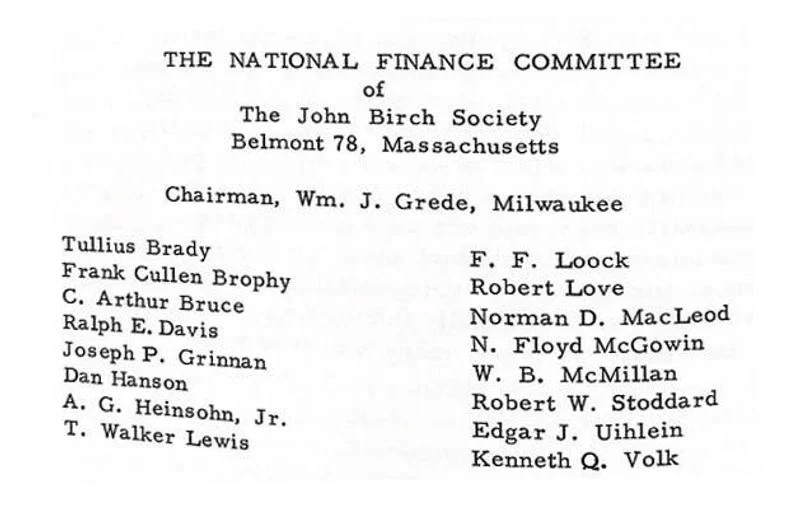
Edgar J. Uihlein was listed as a member of the John Birch Society’s National Finance Committee in a July 1963 bulletin.
The group fiercely opposed civil rights. An entry in one 1963 Birch newsletter railed against the upcoming March on Washington for Jobs and Freedom, where Martin Luther King would give his “I Have a Dream” speech: “the only good Americans who should have anything to do with this Communist-instigated mob in any way, or pay any attention to it in Washington, are the police required to maintain law and order.”
Edgar Uihlein Jr. supported politicians who embraced segregation. In early 1962, he sponsored a speech that brought to Chicago a former U.S. Army general named Edwin Walker. Walker toured the country attacking supposed communist conspiracies and civil rights, while celebrating the Southern defeat of Reconstruction, which he labeled “the tyranny within our own white race.”
The Anti-Defamation League, which tracked far-right figures in the period, has archives showing Edgar Uihlein Jr.’s involvement with several other groups and campaigns, including a $1,000 contribution to the presidential campaign of segregationist George Wallace in 1968. It’s not clear when, if ever, Uihlein’s association with the John Birch Society ended. As late as 1977, the founder of the group wrote a long letter to him asking for money.
Edgar Uihlein Jr.’s second child, Dick, born in 1945, grew up in the wealthy Chicago suburb of Lake Bluff and got the same sort of blue-blood education (Phillips Andover, Stanford) as his father (Hotchkiss, Princeton). Amid the social upheavals of the ’60s, Dick Uihlein didn’t waver: He married Liz before graduating from college in 1967, joined the family business and immersed himself in conservative politics. He worked on the 1969 Illinois congressional campaign of Phil Crane, who won a crowded Republican primary in an upset on a hardline anti-tax and anti-communist platform.
In one of the only interviews he’s ever given, Dick Uihlein told National Review in 2018 that he got his politics from his father, who often went by Ed. At the family breakfast table growing up, Uihlein recalled, “My father would talk about the importance of capitalism and the evils of socialism.” Dick said that same year that “my father shared many of the same values that I have, conservative values.”
Dick and Liz Uihlein continue to revere Edgar Jr., who died in 2005. Dick Uihlein named the family foundation after his father, and it now sends tens of millions of dollars to right-wing institutions. Among the recipients of the Ed Uihlein Family Foundation’s grants are the Federalist Society and think tanks that have pushed misleading claims about the 2020 election, such as the Conservative Partnership Institute and the Foundation for Government Accountability, as the Daily Beast reported.
Tucked in toward the back of the Uline catalog released this summer, sent out to millions of homes and businesses, was a long tribute to the “wise” Edgar Uihlein Jr.
“Father Uihlein, the head of the family, had a towering presence, and we respected his values,” wrote Liz Uihlein under a picture of her husband and father-in-law, recalling “frequent dinners at his house, where business, issues of the day, fishing muskies and, always, politics were discussed.”
She ended on a note of nostalgia tinged with bitterness: “Living your life and raising your kids were easier in an easier time. There was no legalized marijuana, defund the police or social media. We, like so many families, were raised with a sharp moral compass. The rules were the rules, but it was OK.”
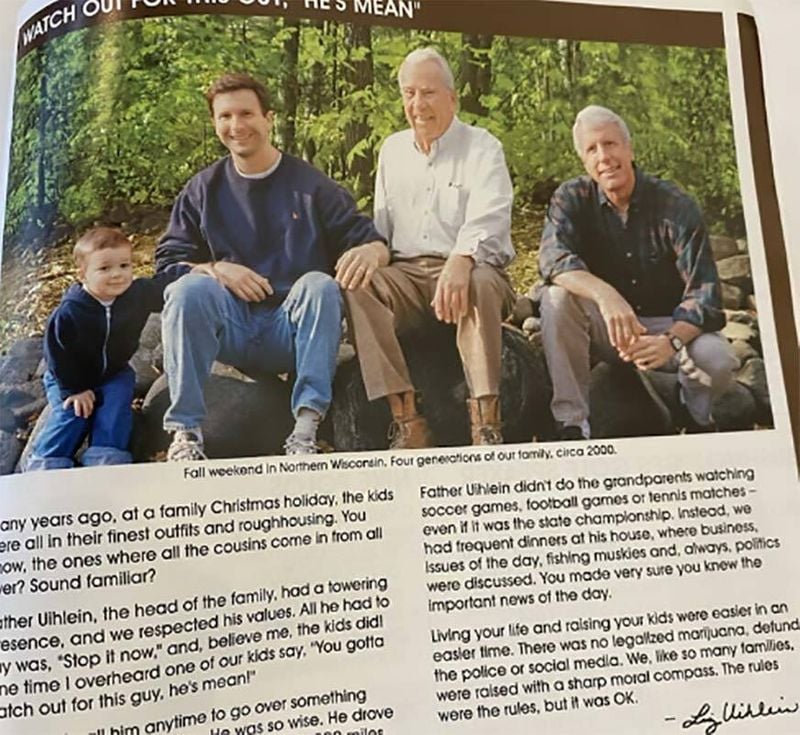
Liz Uihlein wrote a tribute to Edgar Uihlein Jr. in a recent edition of the Uline catalog. Dick Uihlein is sitting on the far right next to his father.
The Uihleins’ political giving reflects these longings for a bygone era. Dick Uihlein is a major funder of the American Principles Project, which runs ads attacking what it calls “transgender ideology,” abortion and the teaching of “critical race theory.”
Last year, Uihlein weighed in on recalling four school board members in a small town north of Milwaukee because of their support for COVID-19 safety protocols and “equity” training for teachers. More recently, in his home state of Illinois, Uihlein has spent more than $50 million to back the Republican gubernatorial candidate Darren Bailey, who has drawn criticism for saying the Holocaust “doesn’t even compare” to the toll of abortions and for accusing Democrats of “putting perversion into our schools” for adopting a sex ed bill that includes information about gender identity and same-sex couples.
The Uihleins were huge beneficiaries of a tax provision promoted by Sen. Ron Johnson, R-Wisc., that was included in the Trump tax overhaul and are continuing to support the Wisconsin senator and fund attack ads against his opponent.
For all the Uihleins’ dismay at the disorder they see consuming the country, there is one domain where they can exert near total control. Former employees of Uline told ProPublica the couple’s traditionalist politics govern the smallest details of how the company is run.
For new staffers, it begins with the dress code in the employee handbook: Women are not permitted to wear pants except as part of a pantsuit or on Fridays; hose or stockings must be worn except during the warmer months; dresses “that are too short” and corduroy of any kind are strictly prohibited.
“DRESS CODE VIOLATIONS ARE TAKEN SERIOUSLY AND MAY RESULT IN DISCIPLINARY ACTION UP TO AND INCLUDING TERMINATION,” the handbook warns.
The handbook defines “tardy” as one minute past an employee’s scheduled start time. Just four personal items are allowed on employees’ desks, with maximum dimensions of 5 inches by 7 inches. One former staffer at Uline’s headquarters recalled a coworker who was forced to remove several drawings done by his young child. “Liz would walk up and down the aisles, and if your desk looked off, you’d be written up,” he recalled.
The Uihleins have enlisted company employees to manage their vast personal real estate holdings and maintain their exacting standards, records obtained by ProPublica show. While the Uihleins’ primary home is in Lake Forest, Illinois, they also have several waterfront properties in Florida. In one case, a Uline staffer emailed an official in Everglades City to complain after surveillance footage showed a local man “peeing off Dick’s dock.”
The family’s management style has worked well for the company. Founded in 1980 when Dick and Liz Uihlein saw a gap in the market and borrowed money from Dick’s father to launch a shipping supply distributor, Uline has grown to a network of 12 vast warehouses around the country as well as in Canada and Mexico. Uline’s signature marketing product, its Sears-style catalog, now runs over 800 pages, offering endless varieties of paper bags, packing tape, foaming hand soap, metal racks and more.
Liz Uihlein runs day-to-day operations from the company’s Pleasant Prairie, Wisconsin headquarters, right over the Illinois border. Her obsessive focus on next-day shipping and customer service — “We answer the phones faster than 911,” a company saying goes — have powered Uline’s expansion.
Growth accelerated with the online shopping boom that relies on Uline’s specialty, cardboard boxes, which it carries in more than 1,700 sizes. “It’s weird to develop a love of corrugated boxes and shipping supplies, but I really enjoy” it, Liz Uihlein told a Milwaukee business newspaper.
Uline is now so dominant that its customers range from high-end firms like Tesla and Gucci to countless small merchants on Etsy to huge municipal governments. The New York City Department of Education and other agencies, for example, collectively spend more than half a million dollars per year with Uline.
Unlike at other corporate workplaces where discussing politics is tacitly discouraged, the Uihleins lean in to theirs. Employees gathered at the major Uline distribution center in Allentown, Pennsylvania, for a company party in 2019 were bemused when the entertainment hired by the company emerged on stage: a Donald Trump impersonator, wearing a red MAGA hat. The company regularly hosts “Lunch & Learn” sessions at its headquarters with figures such as former Wisconsin Gov. Scott Walker, as the Guardian reported.
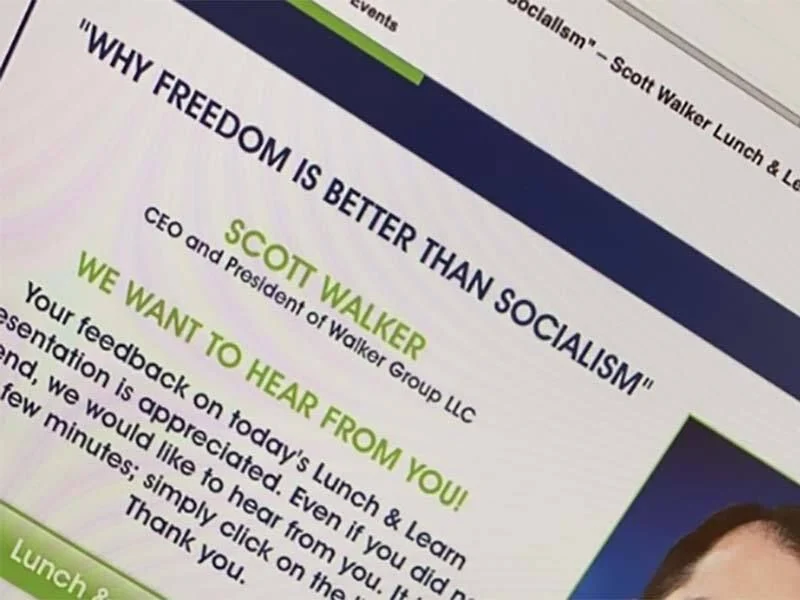
An excerpt from a 2020 email sent to Uline employees for a talk on “Why Freedom Is Better Than Socialism”
In 2018, when the New York Times published a profile labeling the Uihleins “The Most Powerful Conservative Couple You’ve Never Heard Of,” the company began to get calls from angry liberal customers canceling their accounts, a former sales staffer recalled. A website, Refuse Uline, was launched that lists alternatives to the company. But as the company’s only shareholders, the Uihleins only have to answer to themselves.
When COVID-19 hit, as Liz Uihlein campaigned against shutdowns and required workers to return to the office before vaccines were available, demand for Uline’s shipping and cleaning supplies surged. In 2020, as other businesses shuttered, sales at Uline shot up 14% to $6.5 billion, according to an internal report obtained by ProPublica. Stung by a worker shortage, Uihlein emailed Wisconsin’s Democratic governor in July 2021 urging him to “get government out of the way” by immediately cutting people off of expanded federal unemployment benefits that had helped people weather the pandemic. Uline needed to fill 500 jobs, she noted in the email, which ProPublica obtained via a public records request. The governor did not oblige.
It’s not clear when the Uihleins, who are both 77, will retire. But the next generation is in place. The couple’s adult children are executives at the company, and they have begun to give money to federal candidates — all conservatives. Dick and Liz Uihlein, meanwhile, have been taking steps to preserve their multibillion-dollar empire for their descendants by shielding it from the hated estate tax.
Over the years, they have gradually transferred the shares of Uline into a so-called “dynasty trust,” which now appears to hold a majority of the company, according to the tax records and business documents filed in Florida. Bob Lord, a lawyer at tax reform group Patriotic Millionaires, said dynasty trusts are typically designed to avoid estate and other transfer taxes for ultrarich families.
“The goal is for the company to remain in the family for possibly hundreds of years,” he said. “And the wealth generated by the company will accumulate untouched by estate tax.”
Republished with permission from ProPublica, by

ProPublica
ProPublica is an independent, nonprofit newsroom that produces investigative journalism with moral force. They dig deep into important issues, shining a light on abuses of power and betrayals of public trust — and they stick with those issues as long as it takes to hold power to account.
With a team of more than 100 dedicated journalists, ProPublica covers a range of topics including government and politics, business, criminal justice, the environment, education, health care, immigration, and technology. They focus on stories with the potential to spur real-world impact. Among other positive changes, their reporting has contributed to the passage of new laws; reversals of harmful policies and practices; and accountability for leaders at local, state and national levels.

